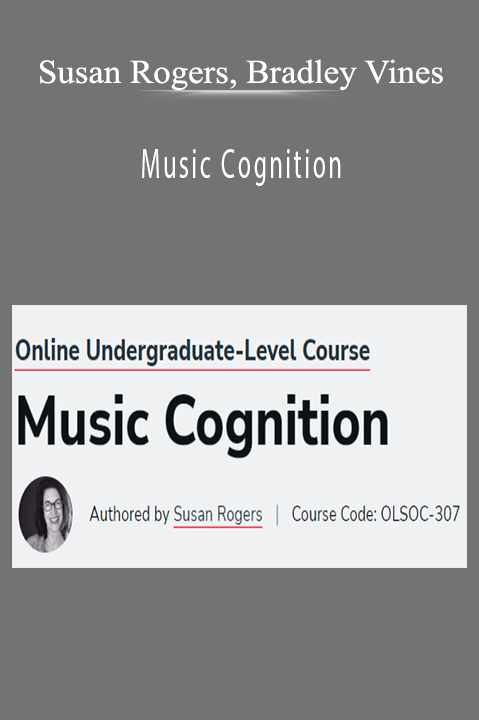Susan Rogers, Bradley Vines – Music Cognition
For many of us, music is a powerful companion through life in the best and worst of times, and in everything in between. Why is this so? Music Cognition seeks to answer this question by exploring the mental processes underlying musical behaviors and how emotion, environment, cognitive capacity, personality, individual differences, and other factors influence how we perceive music. This understanding will bring new insight to music professionals, songwriters, and to music lovers who want to increase their knowledge of, and appreciation for, both music and the brain.
The course begins with the scientific method important for understanding what research has to say about music and the brain. It explores the nature of mental activities, and the brain and the neural architecture supporting thoughts and emotions. It then delves into how we perceive pitch, rhythm, tonality, and timbre, including distinctions between people who have perfect pitch and those who do not, how our perception of rhythm gives rise to musical expectancies, and how certain cognitive factors promote the development of musical systems.
The course examines human development with regard to how and when musical behaviors emerge and what methods improve musical practice. It takes a close look at musicians’ brains and how they process audio signals differently from non-musicians. It also explores arguments for and against the notion that music-making is an evolutionary adaptation in humans. The course then looks at emotion, memory, and personality, including the link between emotional responses and the acoustic cues in musical signals, strategies the brain uses for memorizing thousands of songs, the role music plays in preserving memories, and the significant ties between personality traits and musical preferences.
Music cognition is a fascinating, growing branch of experimental psychology: One that is shaping not only neuroscience and child development but many areas of the music industry, from music theory, music therapy, and music education to music performance and music production and engineering. Music Cognition students will come away from this course with a deeper understanding of the complexities of the human brain with regard to music, in addition to developing their critical thinking skills and ability to evaluate scientific findings related to music and the brain.
By the end of the course, you will be able to:
- Understand the scientific method as applied to experimental psychology
- Understand the organization and mechanics of the central nervous system
- Understand the mechanics of human hearing and the auditory pathway
- Identify the processing stages of sensation, perception, and cognition
- Identify perceptual processes such as pitch, timbre, duration, and auditory grouping
- Define the stages of music acquisition
- Distinguish between innate and acquired differences in musical abilities and in performance effects
- Identify the acoustical correlates of musical expertise
- Evaluate evidence for the evolution of the music faculty as separate from language
- Understand mechanisms of musical emotions
- Understand memory systems and how they process music
- Recognize the links between music preferences and personality
- Understand how musical training in childhood shapes the brain and auditory pathway
Syllabus
Lesson 1 Cognitive Psychology and The Scientific Method
Lesson 2 Neurophysiology of Hearing
Lesson 3 Pitch Perception
Lesson 4 Auditory Scene Analysis and Rhythm Perception
Lesson 5 Tonality and Timbre Perception
Lesson 6 Musical Development
Lesson 7 Musical Expertise and Performance
Lesson 8 Music and Evolution
Lesson 9 Music and Emotion
Lesson 10 Music and Memory
Lesson 11 Music and Personality
Lesson 12 Individual Differences and Outstanding Questions
Requirements
Prerequisites and Course-Specific Requirements
Completion of Introduction to College Writing or equivalent knowledge and experience is required.
Recommended Textbook(s)
- Music, Thought, and Feeling: Understanding the Psychology of Music by William Forde Thompson, Oxford University Press
Instructors
Author
Susan Rogers holds a Doctorate in Psychology from McGill University (2010), where she studied music cognition and psychoacoustics under researchers Daniel Levitin and Stephen McAdams. Her research focuses on auditory memory, the perception of musical signals, and the influence of musical training on auditory development. For two decades prior to her science career, Susan was one of the world’s few women known for her work as a record producer, engineer, mixer, and audio electronics technician. Career highlights include five years (1983-1987) as staff engineer for Prince, producing hit singles for diverse artists such as Barenaked Ladies, David Byrne, Robben Ford, Jeff Black, and Rusted Root, mixing hit singles for an equally eclectic list including Tricky, Michael Penn, Toad the Wet Sprocket, and Tevin Campbell, and engineering for a host more.
Susan is a professor at Berklee College of Music in the departments of Music Production & Engineering and Liberal Arts, and is the director of the Berklee Music Perception and Cognition Laboratory. In 2012, she was awarded the Distinguished Faculty Award, Professional Writing and Music Technology Division.
In tandem with business partner and former student Matthew McArthur (Berklee ’10), Susan launched Boston’s first not-for-profit recording studio, The Record Company, to offer low-cost recording facilities to area musicians and free music technology instruction to area teens.
Author & Instructor
Bradley Vines has 10 years of academic research experience focusing on the psychology and neuroscience of music, including PhD research at McGill University and postdoctoral work at Harvard and the University of California. For the past 5 years, he has been working in the field of consumer neuroscience as Director of Neuroscience at Nielsen, with a focus on the contribution of music to advertising and branding. Bradley also holds an MBA from the University of Oxford and is a saxophonist.
What’s Next?
When taken for credit, Music Cognition can be applied towards these associated programs:
Associated Certificate Programs
- General Music Studies Professional Certificate
- General Music Studies Advanced Professional Certificate
Associated Degree Majors
- Bachelor’s Degree in Music Production
- Bachelor’s Degree in Music Business
- Bachelor’s Degree in Music Composition for Film, TV, and Games
- Bachelor’s Degree in Electronic Music Production and Sound Design
- Bachelor’s Degree in Interdisciplinary Music Studies (Create Your Own Major)
- (Pre-Degree) Undeclared Option
- Bachelor’s Degree in Songwriting
- Bachelor’s Degree in Guitar
- Bachelor’s Degree in Songwriting and Producing Music
Digital Download Susan Rogers, Bradley Vines – Music Cognition at Offimc.click Now!
Delivery Information
- Upon ordering the product, a delivery email with download instructions will be sent immediately to you so that you may download your files. If you log in (or create an account) prior to purchase you will also be able to access your downloads from your account dashboard.
- It is a digital download, so please download the order items and save them to your hard drive. In case the link is broken for any reason, please contact us and we will resend the new download link to you.
- If you don't receive the download link, please don’t worry about that. We will update and notify you as soon as possible from 8:00 AM – 8:00 PM (UTC+8).
- Please Contact Us if there are any further questions or concerns you may have. We are always happy to assist!








7 reviews for Music Cognition – Susan Rogers, Bradley Vines
There are no reviews yet.